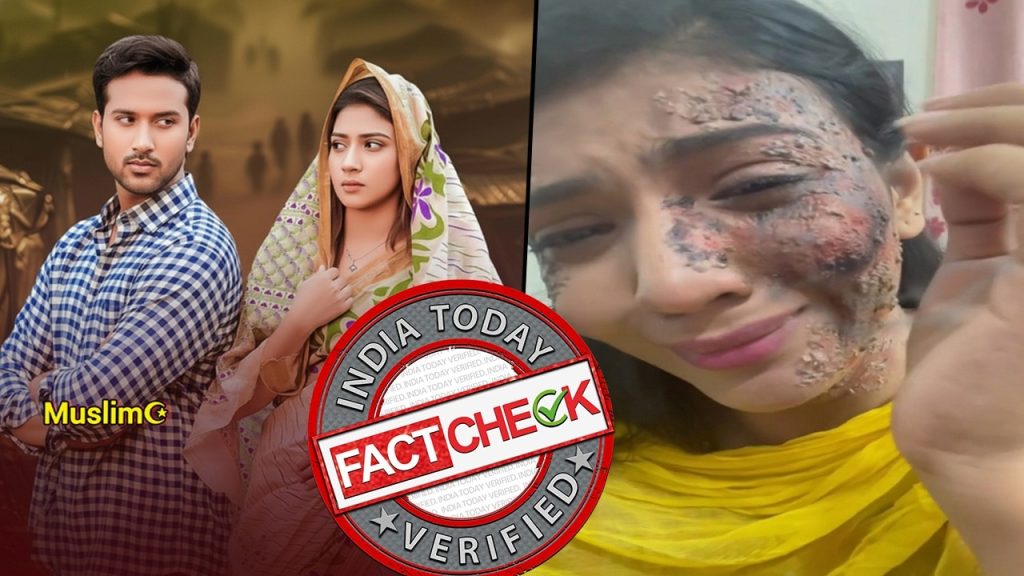Listen to the article
Fabricated Assault Story Uses Bangladeshi Actress’s Film Images to Stoke Communal Tensions
A false narrative circulating widely on social media platforms has been debunked by fact-checkers at India Today. The viral posts claimed to show a Hindu woman named Nandini Mandal who allegedly converted to Islam after marrying a Muslim man named Abdul Adil Khan, only to be later assaulted and thrown out by her husband.
The misleading posts feature two images: one showing a couple labeled as “Muslim” and “Hindu,” and a second disturbing image of a woman with severe facial burns. According to the fabricated story, both images depict the same woman before and after the alleged assault.
However, an investigation revealed that both images are actually of Bangladeshi actress Jouty Islam and are completely unrelated to any real-life incident of domestic violence or religious conversion.
The image showing the woman with burn injuries was traced back to Jouty Islam’s Facebook page, where she posted a video on October 21 featuring the makeup effects. The actress clearly indicated in the comments section that the burn makeup was part of a film shoot for a project titled “Ami Nusrat Bolchi.”
Further research uncovered that the first image, showing the couple, is actually a promotional poster for a different film starring Islam. The poster, found on her Instagram account, is for a Bangladeshi movie whose title translates to “Widow Wife” in English.
This fabrication represents a troubling example of how entertainment industry content can be maliciously repurposed to create false narratives designed to inflame religious tensions. By presenting a film actress’s professional work as evidence of interfaith marriage violence, those sharing these posts appear to be deliberately stoking communal divisions.
The incident is part of a concerning pattern of misinformation that targets interfaith relationships in South Asia. False stories about “love jihad” – a term used to promote conspiracy theories about Muslim men allegedly luring Hindu women into marriage for conversion – have become increasingly common on social media platforms in recent years.
Social media platforms have struggled to contain such misinformation, which often spreads rapidly through messaging apps and closed groups before fact-checkers can intervene. By the time a false narrative is debunked, it may have already been viewed by thousands or even millions of users.
Digital literacy experts recommend that social media users verify images through reverse image searches before sharing emotionally charged content, particularly when it involves claims of violence or religious conflict. In this case, a simple reverse image search would have revealed the actress’s original posts and the film context.
The circulation of these false claims highlights the importance of critical media consumption in an era when digitally altered or decontextualized images can be easily weaponized to advance divisive agendas.
No credible news reports could be found about any woman named Zara Islam or Nandini Mandal being tortured by her husband after religious conversion, further confirming the fabricated nature of the viral posts.
This incident serves as a reminder that film and entertainment industry materials are particularly vulnerable to manipulation for propaganda purposes, as dramatic imagery can elicit strong emotional responses when presented without its original context.
Fact Checker
Verify the accuracy of this article using The Disinformation Commission analysis and real-time sources.




10 Comments
This case highlights the need for greater media literacy and critical thinking when it comes to evaluating information online. Fact-checking is essential to counter the spread of fabricated narratives that can have real-world consequences.
The use of unrelated images to support a completely fabricated story is a concerning tactic that must be addressed. Fact-checking is essential to maintain the integrity of public discourse and prevent the spread of harmful misinformation.
This is a good example of how social media can be misused to spread misinformation and false narratives. It’s concerning to see how quickly these kinds of fabricated stories can gain traction online. Robust fact-checking is essential to counter such manipulation.
Fabricated stories that weaponize sensitive issues like religion and communal tensions are particularly troubling. I’m glad the fact-checkers were able to expose the true nature of this misleading content and prevent further harm.
It’s crucial that people remain vigilant and verify information, especially when it comes to topics that could stir up tensions or have serious implications. Fact-checking is a vital tool in the fight against online misinformation.
This is a clear case of misinformation and fabricated narratives being spread online. It’s concerning to see how false stories can be amplified and used to stir up communal tensions. Fact-checking is crucial to counter such disinformation.
Misleading posts like these, which falsely link unrelated images to sensational claims, can be very damaging. I’m glad the fact-checkers were able to trace the images back to the Bangladeshi actress and debunk the entire fabricated story.
It’s important that people are vigilant about verifying information, especially when it comes to sensitive topics like religion and communal issues. Fact-checking helps maintain the integrity of public discourse.
The use of unrelated images to support a completely fabricated story is a concerning tactic. I’m glad the fact-checkers were able to trace the origin of the images and expose the true nature of this misinformation campaign.
It’s important that people approach online content, especially on sensitive topics, with a critical eye. Fact-checking and verifying information is crucial to prevent the spread of harmful misinformation.